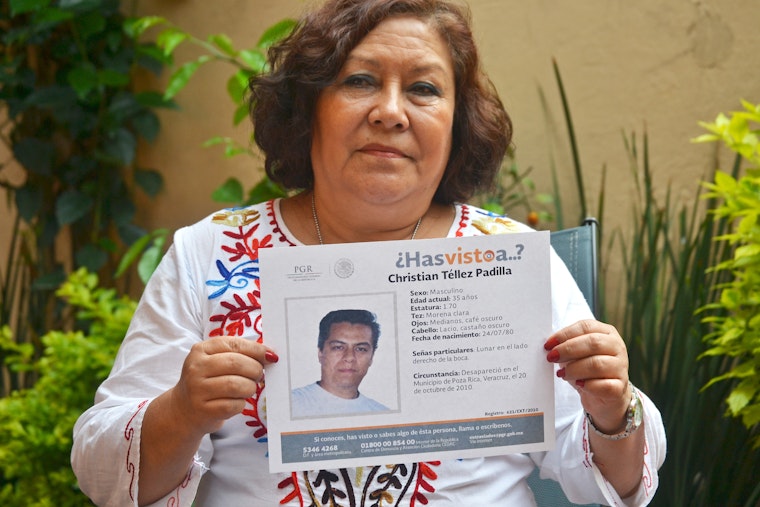Case Watch: UN Finds Mexico Responsible for Man’s Disappearance, Relies on Witness’s Word
By Natasha Arnpriester & Juan Carlos Gutierrez

On October 20, 2010, Christian Téllez Padilla was driving through Veracruz, Mexico when the intermunicipal police pulled him over. Eight armed officers surrounded Christian at gunpoint, forcing him out of the car. His partner Aidée was driving a van behind him. She watched in horror as they detained and dragged Christian into a police vehicle. Aidée attempted to trail the vehicle, but two officers riding motorcycles stopped and threatened her.
Unable to follow Christian, Aidée proceeded to the police station where authorities claimed to have no record of Christian. The next day, Christian’s family went back to the station and officers told them there was no record of his arrest. The officers allowed the family limited access to the station’s detention facilities, but they were prevented from accessing certain areas.
Unable to find Christian, his family contacted state authorities requesting assistance to locate him. Some ignored their pleas, while others initiated preliminary investigations—though all proved ineffective in establishing Christian’s whereabouts.
Evidence which could implicate those involved was tampered with or deliberately ignored. Some of the officers Aidée identified were discharged by their supervisors—supervisors who were later arrested on suspicion of their links to Los Zetas, one of Mexico’s most dangerous drug cartels. The officer on a motorcycle who stopped Aidée provided an alibi, which the government accepted without scrutiny.
Since the start of Mexico’s drug war in 2006, more than 40,000 people, like Christian, are believed to have disappeared by force. The Mexican government acknowledges this is a disquieting underestimation of the situation. While remains fill the thousands of mass graves that line the countryside, very few families have located their disappeared loved ones.
After years of their own investigation and pleading with the Mexican government to tell them what happened to Christian, his family sought recourse with the United Nations. In August 2019, the United Nations found Mexico responsible for Christian’s enforced disappearance, marking the first time ever that a UN treaty body has ruled Mexico responsible for such a violation.
Under international human rights law, an enforced disappearance occurs when a person is abducted by, or with the acquiescence of, a state, and the state refuses to acknowledge the person’s fate or whereabouts. In these circumstances, the person is removed from the watchful eye of the state’s law, thus increasing the likelihood that the disappeared person will be tortured or extrajudicially killed.
Represented by I(DH)EAS, Strategic Human Rights Litigation—a legal aid organization based in Mexico—Christian’s family brought their case to the UN Human Rights Committee, the treaty body mandated to monitor states’ compliance with the International Convention on Civil and Political Rights (ICCPR). As a party to the convention, Mexico has the legal obligation to implement its provisions.
Mexico did little to rebut the allegations made against it, arguing that it had nothing to do with Christian’s disappearance and did enough to fulfill its duty to investigate. As proof, Mexico provided the officer’s alibi, and noted that no other officers acknowledged their participation in the apprehension. According to Mexico, this demonstrated that there was no evidence to support Aidée’s eyewitness account, thus it was not responsible for Christian’s disappearance.
In its deliberations, the Committee recalled its precedent on burden of proof, noting that the burden cannot fall exclusively on the victim, given that victims usually do not have the same access to evidence as the state, who is frequently the only party with access to relevant information. The Committee clarified that when victims submit “credible allegations” and when information to disprove those allegations is “exclusively in the possession of the state…the Committee may consider [the allegations] to be substantiated if the State…does not refute them by providing satisfactory evidence or explanations.”
The Committee explained that it was “highly questionable” to dismiss Aidée’s testimony based on denials of involvement by the police officials in question. Citing case law from the Inter-American Court of Human Rights, the Committee reasoned, “it is neither logical nor reasonable to investigate an enforced disappearance and to make its resolution subject to the acceptance or confession of the possible perpetrators…involved.”
Given the account of the facts and documentation submitted by Christian’s family, and particularly Aidée’s eyewitness account, the Committee determined credible allegations were made and that Mexico had not provided “satisfactory evidence or explanations” to rebut them. The Committee concluded that Mexico was responsible for Christian’s enforced disappearance.
The term “enforced disappearance” is not explicitly mentioned in the ICCPR, but it implicates violations of multiple rights contained within the Convention. These include the right to life, the prohibition of torture and cruel and inhumane treatment, the right to liberty and security, the right to recognition of legal personality and the right of an effective remedy. The Committee found that Mexico also violated each of these rights.
This case matters for victims of enforced disappearances as it solidified the importance of burden shifting and a rebuttable presumption. A rebuttable presumption is an assumption that an alleged fact is true, unless it is proven otherwise. The Committee’s reliance on this for its decision demonstrates its belief that the state, rather than victims, should carry the burden in these tragic cases.
Nearly nine years have passed since Christian’s whereabouts were last known. While the Committee’s decision does not clarify what happened to Christian, the case does advance the Committee’s jurisprudence in a way that helps to protect and assist victims who are coping with the loss of their loved ones, searching for answers and seeking redress and justice.
Natasha Arnpriester is an advocacy officer with Open Society Justice Initiative.